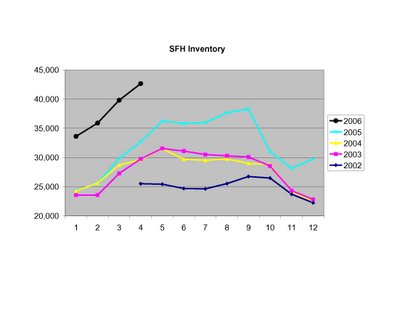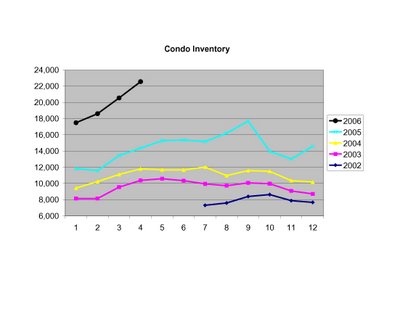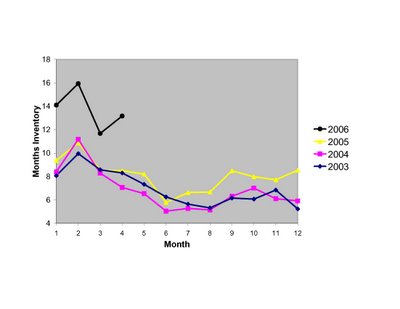The Massachusetts Association of Realtors (MAR) released cumulative market numbers for the 1st quarter of 2006 today, accompanied by a press release (here). Overall, 1st quarter sales of single family homes were off 6.5% relative to the 1st quarter of last year, while condo sales were basically flat relative to last year. SFH prices dropped 0.9%, while condo prices were up 2.4% relative to 1st quarter 2005. I have some doubts about the condo prices they report, given that their own monthly reports for Jan, Feb, and Mar report YOY price increases for condos of 1.9, 2.2, and 2.2%. No way this could result in prices for the quarter being up 2.4%. Nevertheless, the downward trends in price appreciation that began in the second quarter of last year remains intact.
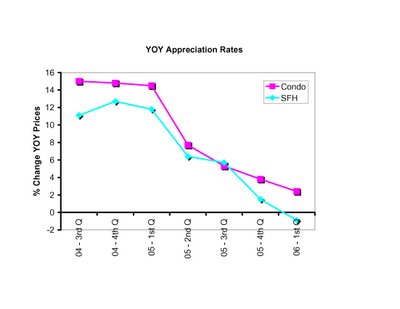
In one year we've decelerated from double digit price appreciation to flat or negative price appreciation. Those with the most interest in keeping the market afloat continue to paint lipstick on this pig (see the MAR press release, and the latest Boston Magazine - BUY, BUY, BUY), uttering all the reassuring phrases about normalization, healthier levels of inventory, soft-landings, buyer's market, etc.
But their reassurances seem to be failing. How do we know? A stunning article in the Boston Herald last week revealed that Coldwell-Banker is, brace yourself, pressuring SELLERS to LOWER PRICES!!! This admission, more than any other, signals the end of the bull market and the true beginning of the housing bear market in Massachusetts. Market participants are out of excuses (weather, hurricanes, wait for the spring market, etc.), and it's clear to almost everyone that the sellers vastly outnumber the buyers. Want to sell your house? Price below the competition, and be prepared to negotiate. First time buyer? Wait if you can. If not, take your time, find exactly what you want, and offer below asking (after all, prices will likely be lower in a year).
Don't believe me? Ask Fortune, who labelled the Boston housing market a "Dead Zone" that is 30% overvalued. They lay out a worst case scenario:
For the past few years the housing boom has driven the economy, adding jobs in construction, remodeling, and real estate services. And consumers gorged on the equity in their homes, taking out a total of $2 trillion via loans, refinancings, and sales over the past five years.
Those powerful stimulants, which added a full point to annual GDP growth, will soon vanish. If corporate spending or some other force doesn't come along to pick up the slack, we could go into a recession that would cut income growth to zero. Then inflated housing prices would have to shoulder the entire, wrenching adjustment, falling 30 percent or more over several years.
Why worry about a seemingly unlikely worst-case scenario? Take a look at the homebuilders, on the front lines of the housing market nationwide. Their confidence in the future of the market is falling like a rock, and has reached an 11-year low (link here), while their stock market values have been tanking (52-week lows today for PHM, CTX, HOV, RYL, DHI).
Given the hand-wringing at Coldwell-Banker, I'm guessing the April numbers (to be released next week by MAR) are not pretty, and the spring market will prove insufficient to reverse current trends. At that point reality will be harder to sugar-coat, pressure on 'must-sell' sellers will continue to ratchet up, and price declines should accelerate.
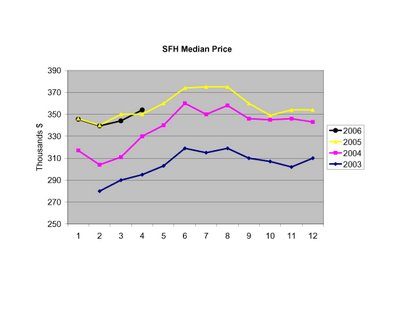
 The unsold inventory of SFHs continues to surge...
The unsold inventory of SFHs continues to surge...